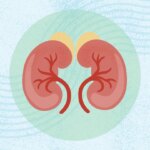“The experience of living with CAH, whether as a parent or an individual, can evoke a complex mix of emotions and challenges, influencing everything from daily routines to social connections and mental health,” says Cindy Buchanan, PhD, a licensed clinical psychologist and associate professor of psychiatry and surgery at the University of Colorado School of Medicine in Denver.
Feelings of anxiety and frustration are common, due to the physical changes that accompany the condition, such as acne, early puberty, rapid growth, and excess facial and body hair in girls. The task of managing daily medications to treat CAH, along with the general fear of other possible health complications — shortened height in men and irregular periods plus male body traits and infertility in women — can also affect mental health.
“Other challenges for those with CAH include the fear of adrenal crisis, frustration, isolation, feelings of helplessness, and hypervigilance,” says Dr. Buchanan, who works with children managing chronic conditions such as CAH.
Findings from a study underscore these emotions, noting that young people can experience feelings of inadequacy and self-consciousness as they struggle to make friends or form romantic relationships, leading to sadness and even depression. On top of these struggles, children with CAH tend to miss school more often to attend medical appointments, which may then affect their academic success and potential job prospects down the road.
Parents of children with CAH have their own set of worries, as the genetic nature of CAH can contribute to self-blame. And, as with any chronic illness, a parent may feel emotional strain caused by frequent doctor visits, financial burdens due to medical treatments and missed work days, and familial guilt if their other children and partner receive less of their time and attention.
“Parents may also have concerns about their children’s future, including questions about fertility potential, the impact of hormone treatment on growth and development, and how their child will navigate social relationships and independence,” says Buchanan. “And they may fear making medical mistakes or worry about their child feeling different or isolated.”
But there’s a bright side to dealing with a condition such as CAH, too, she adds. Along the journey of managing CAH, “Many families and individuals also discover strengths, resilience, and empowerment through knowledge, increased family bonding, adaptability, a sense of mastery, connection, advocacy, and a deeper appreciation of their health and well-being.”
Read the full article here




